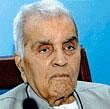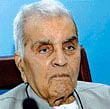

It is ironic that a debate is going on whether a person against whom a case under Prevention of Corruption Act is pending should have been appointed Chief Vigilance Commissioner.
It may be recalled that the Central Vigilance Commission (CVC) had been set up by a Government Resolution in 1964 but attached to the Ministry of Home Affairs of the Central Government. Many were not happy at the CVC being amenable to the Ministerial influence. Though a demand for statutory status was continuously made, it was only after a Supreme Court directive in the Vineet Narain Case (1997) that an attempt was made to strengthen it. But due to various circumstances it was only in 2003 that the Central Vigilance Commission Act 2003 could be passed
consisting of a Central Vigilance Commissioner and two Vigilance Commissioners.
To further strengthen their independence, their appointments were to be made on the recommendation of a high-powered committee consisting of the Prime Minister, the Home Minister and the leader of opposition in Lok Sabha. The term is for four years and removal can only be on the ground of misbehaviour on a reference being made to the Supreme Court by President.
Unfortunate blunder
It may be debatable whether the institution of CVC has succeeded in checking corruption considering the scams we are facing today but what has unnerved people is the dogged and persistent defiance of the Central Government in conceding that it made an unfortunate blunder in approving the name of PJ Thomas as CVC by a majority of two.
But what is disturbing - and which remains unanswered - is what was the compulsion in appointing Thomas as CVC when the Home Minister, a member of the Committee, admits that the panel was aware of the corruption charges against him.
The Minister also knew that the High Court of Kerala had directed the continuance of the trial. The argument that the case is weak or that the Central Government had at one time not given sanction, frankly, is immaterial at this stage of appointment.
Questionable logic
Is not every Indian entitled to ask why is the Government giving us a CVC who at present has a shadow over him? Will not the faith of the average person in fighting corruption be frustrated by this? No doubt politicians were peeved when the counsel for Thomas pointed out that over 28 per cent of the MPs have criminal charges against them and if they can still continue as MPs why not Thomas as CVC? This is convoluted logic.
Of course, the politicians, though right in their stand against continuance of Thomas, have nevertheless to answer to the public the truism “Physician, heal thyself first”. But then, surely, people in India are entitled to an anti-corruption mechanism which on the face of it will give assurance of determination to fight corruption.
I remember an instance of Gandhiji who taught us that morality is the first priority in politics. He was to appoint a member of the Congress Working Committee in 1940. He had finalised the name of Congress leader Caveshwar. But before Gandhiji could announce the name, he was sent a written statement filed by Caveshwar in reply to a suit that he owed Rs. 2,000 to the plaintiff.
In a reply drafted in usual manner by lawyers, which he signed routinely, it was said, “I have not taken the amount – but even if I have, I am not liable to pay because it is time barred” – a perfectly legal defence for an ordinary defendant. But to Gandhiji, morality was above all he reacted thus: “It is all right to deny if a person has not borrowed money – but a person says he owes money and will not pay because of limitation cannot be a member of the working committee”. This was the standard set by the Father of Nation. Will our present leaders follow the same?
The writer is a retired Chief Justice of Delhi High Court. He is also the Chairperson of Prime Minister’s High Level Committee on status of Muslims and a former UN Special Rapporteur on Housing.
UPA Govt scores a self-goal
SC steps in to check and balance